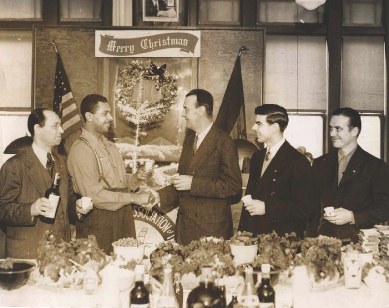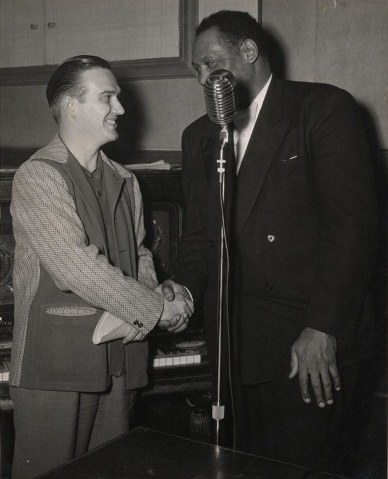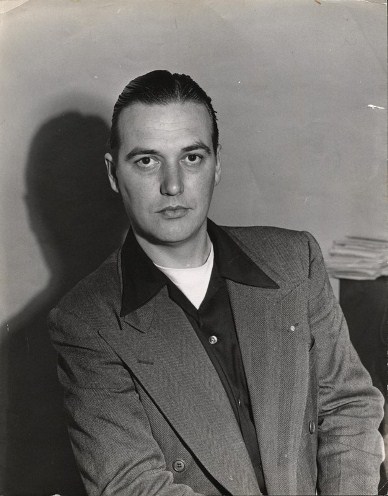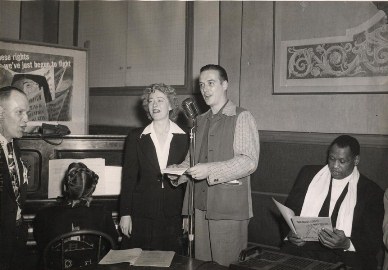With Paul Robeson
Jerry Tyler hosted Paul Robeson on his "Reports from Labor" radio show when the famous performer/activist visited Seattle in 1947. Click to read more about the visit and hear an mp3 recording of the show in which Robson sings "The Ballad of Joe Hill" and "Far and Wide."
by Leo Baunach
Maritime worker, labor activist, and radio personality, Jerry Tyler was a Seattle labor celebrity from the 1940s until his death in 2009. The radio voice of organized labor in Seattle and the Pacific Northwest, he is most remembered as the host of Reports from Labor, a popular radio show in the Seattle area which ran from 1948 to 1950.
The years Tyler worked as a broadcaster were defined by red-baiting, the impact of the Taft-Hartley Act, and the acrimonious breakup of the Congress of Industrial Organizations. The radio show made Tyler one of the few pro-labor voices on-air in the late 1940s, and he used this unique platform to combine in-depth coverage of Northwest unions with progressive commentary on issues including civil rights and unemployment.
Tyler presented information in a straightforward manner that appealed to the common-sense style of working people. This meant privileging the voices of everyday bus drivers, cannery workers, and others in advocating for labor unity and militancy. Today, Reports from Labor stands as a testament to the fighting spirit of labor’s left-wing in the face of an anti-communist onslaught, and provides an exceptional record of a tumultuous moment in the Northwest labor movement.
Jerry Tyler’s remarkable life began in the small Iowa town of Shenandoah in 1911. Many in the area, including Tyler’s family, were small farmers who struggled to stay afloat amid the high expenses of farming and fluctuating corn prices[1]. Tyler worked from a young age, first on his family’s farm and then as a stoop-laborer in a nursery. Tyler was also employed at an industrial vegetable cannery and went on from high school to a nearby Iowa Community College in 1929. However, the Great Depression began in earnest and there were few options in Iowa for Tyler, whose nascent boxing career ended by his susceptibility to injury. For two years, Tyler drifted around the western United States in search of work, often hopping on railroad cars with crowds of people from a similar socioeconomic quagmire.[2] Tyler eventually gravitated to California where he gained steady employment in Modesto, first on an orchard and then as a nightclub waiter in 1933.[3] Tyler became a member of Waiters Union Local 30, his first experience with organized labor.[4]
Seattle's CIO Radio
Jerry Tyler's "Reports from Labor" was a fifteen-minute, biweekly labor radio show that aired in Seattle between July 1948 and October 1950, making it a rare pro-labor voice during difficult times for working people and progressive politics
In part 2 of his essay, Leo Baunach examines this influential and controversial radio program. Hear original recordings of some shows and transcripts of many others from the Jerry Tyler Collecton, Labor Archives of Washington State, University of Washington Libraries.
Jerry Tyler photo collection: here are photographs of Tyler's radio program, the Marine Cooks and Stewards Union and Harry Bridges
On the air: "Trudy" Strong Kirkwood, Jerry Tyler, and Paul Robeson in the radio station
 University of Washington Special Collections. Acc # 4571-001, Box 3.
University of Washington Special Collections. Acc # 4571-001, Box 3.
Tyler was largely apolitical at this time, recalling that, “I couldn’t see what a working stiff had to do with politics.” Nevertheless, he instinctively possessed a notion of working class solidarity.[5] When the California National Guard, which Tyler had just recently joined, was ordered to break the 1934 general strike in the San Francisco Bay Area, Tyler refused to go on the grounds that, “my old man was a working stiff and I’m a working stiff, and here I’m going to go over there and stick a bayonet in some other poor working stiff. I can’t do it.”[6] Shortly after his stint in the National Guard, he moved to San Francisco and worked as a waiter at the well-known nightclub Goman’s Gay ‘90s for the remainder of the 1930s. Utilizing his talent for writing and storytelling, Tyler published numerous short pulp stories and served as a writer for a local community college newspaper during this period.[7]
The onset of World War Two changed the course of Tyler’s life by offering him the opportunity to go to sea.[8] The need to transport troops increased the availability of on-board service jobs and Tyler joined the Marine Cooks and Stewards of the Pacific (MCS) in search of new experiences. With his familiarity as a restaurant waiter, the union quickly dispatched Tyler onto a Navy ship and he continued to work on troop ships for the remainder of the war. The talkative and affable Tyler became active in the operation and politics of the MCS, both onshore and at sea. On an early voyage, he worked alongside union leaders Hugh Bryson and Joe Johnson. By 1944 Tyler’s growing involvement made him a ship delegate, the onboard equivalent of a shop steward.[9]
The MCS is crucial to understanding the significance of Jerry Tyler and the Reports from Labor.[10] Small yet powerful, racially integrated, thoroughly democratic and relentless in representing the needs of its members, the MCS is exemplary of the brand of left-led unionism that flourished on the waterfront during this period.[11] As Tyler noted, the union let newly joined members speak at meetings, resulting in member turnout in excess of 95 percent in some elections.[12] The union was also a hotbed of leftist and progressive politics. Tyler joined the Communist Party while sailing on the Matsonia during the war. The Party spoke to the first-hand experience that Tyler gained with working class life and struggle, giving it a defined framework that he found attractive enough to join the organization. He later recalled that even during the war, “we had labor troubles. I mean it was obvious that something was wrong with our system, our economy.” [13] This solidified a commitment to left-labor politics that would make him a strong voice for the working person on the corporate-dominated airwaves of Seattle.
Tyler remained a member of the MCS after the end of the war, but when his Northwest-born wife became pregnant he changed his home port from San Francisco to Seattle. [14] There, he began spending more time onshore and became a patrolman––the equivalent to a business agent in other unions––of the Seattle branch of the MCS. This began a period of intense political involvement for Tyler, who in 1946 became the vice-chairman of the Northwest branch of the Committee for Maritime Unity and Vice-President of the Seattle Industrial Trade Union Council, the grouping of Congress of Industrial Organizations (CIO) locals equivalent to a central labor council today. He also served as the publicity chair of the Committee for Maritime Unity during a 1946 strike and went on to become the Industrial Trade Union Council’s top official of secretary in July 1947.[15]
His growing involvement in the Seattle labor movement propelled Tyler toward one of his most important achievements, the creation of a popular labor radio show. In 1948, when President Truman blocked the MCS and seven other waterfront unions from striking during contract negotiations, the Seattle MCS took to the airwaves and selected Tyler to host a bi-weekly segment to educate the public about the maritime struggle. This proved effective, especially during the three-month strike that began in September 1948 when Truman’s injunction expired, and Tyler helped to mobilize other local unions to create a regular program entitled Reports from Labor. It became a dynamic tool of local unions to air their grievances and build ties with workers in other industries, unions and federations. The program also offered progressive commentary on issues including civil rights and unemployment. Niether his position as host of Reports from Labor or as Secretary of the Seattle Industrial Trade Union Council provied Tyler with income. However, in June 1949 he was able to strike a deal with ILWU Local 19 to work part-time at the Port of Seattle in order to continue fulfilling these roles.[16] After the ILWU, MCS, and nine other unions were expelled from the CIO for alleged communist infiltration, Tyler became an organizer for the ILWU and spent two months in Astoria, Oregon successfully fighting a raid by the National CIO on a ILWU local representing fishermen. Amidst the red scare, the radio station management cancelled Reports from Labor in October 1950, removing one of the few pro-union radio programs on the West Coast.[17]
After the show’s termination, Tyler continued to work at the Port of Seattle and briefly continued as the secretary of the almost-defunct Seattle Trade Union Council until its official disbanding in 1951 by a red-fearing national CIO.[18] In June of 1954, Tyler and others in the Seattle left, including Mel Kirkwood, were called before the infamous House Un-American Activities Committee (HUAC); Tyler remained almost entirely silent with the HUAC. Around this same time, Tyler left the Communist Party over an internal disagreement in the Seattle branch and a general unease with the undemocratic nature of decision-making within the Party. [19] However, his exit from the Party did not damper Tyler’s enthusiasm for involvement in the labor movement. By the late 1950s, Tyler became a full-time longshoremen and a regular member of ILWU Local 19.
In 1962, Tyler was elected vice-president of the ILWU local and helped to increase rank and file involvement at membership meetings.[20] He was also elected vice-president in 1963, 1966, and served his final term in 1967.[21] Though Tyler was important to the local because of his consistent popularity and involvement, he is widely and fondly remembered as editor of the Local 19 newsletter The Hook. The publication began in the mid-1960s and became popular with members and their families as an informative and humorous account of the events and personalities of the Seattle waterfront. [22] Even after ending his time as an elected official of Local 19, Tyler remained involved with the activities of the union as a representative to ILWU conventions and was a participant in a three-person 1968 delegation to Czechoslovakia and Egypt that build direct ties of solidarity with foreign workers and gathered information about the situation in Eastern Europe. [23] The trip remained in Tyler’s mind and he decided to begin travelling soon after his retirement from longshoring in early 1974. For the rest of the 1970s, Tyler travelled every year, often returning to Egypt for long periods but also visiting various parts of Europe and Mexico.[24] Tyler continued his writing proclivities, helping to start the Seattle longshore pensioner newsletter The Rusty Hook and authoring two books of short stories while retired in the 1990s in Everett. He remained there until his passing in 2009.
Reports from Labor is one of the most important products of Tyler’s ceaseless work and an example of his unique mix of humor and an assertive defense of labor rights. In a period when American workers were weathering one of their most difficult storms, Tyler stepped forward to give them a place in the public sphere of the Pacific Northwest. Throughout his life, Tyler remained grounded and refused to compromise his values or the integrity of the labor movement.
In part 2 of his essay, Leo Baunach analyzes this influential and controversial radio program.
©Leo Baunach, 2011
HSTAA 499 Spring 2011
[1] Jerry Tyler, interview with Harvey Schwartz, April 24, 2002. Oral History Collection, ILWU Library, San Francisco, 1.
[2] Jerry Tyler, interview with Harvey Schwartz, April 24, 2002, Oral History Collection, ILWU Library, San Francisco, 10. Reports from Labor, June 24, 1949. Jerry Tyler Papers, Box 1. University of Washington Special Collections.
[3] Harvey Schwartz, Solidarity Stories: An Oral History of the ILWU (Seattle: University of Washington Press, 2009).
[4] Jerry Tyler, interview with Harvey Schwartz, April 24, 2002. Oral History Collection, ILWU Library, San Francisco, 8.
Dorothy Cobble, Dishing it Out: American Waitresses and Their Union (Champaign: University of Illinois Press, 1991).
[5] Jerry Tyler, interview with Harvey Schwartz, April 24, 2002. Oral History Collection, ILWU Library, San Francisco, 13.
[6] Ibid, 8.
[7] Harvey Schwartz, Solidarity Stories: An Oral History of the ILWU (Seattle: University of Washington Press, 2009).
[8] Jerry Tyler, interview with Harvey Schwartz, April 24, 2002. Oral History Collection, ILWU Library, San Francisco, 17.
[9] Jane Cassels Record, “The Rise and Fall of a Maritime Union,” Industrial and Labor Relations Review 10, No. 1 (1956): 81-92. Jerry Tyler, interview with Harvey Schwartz, April 24, 2002, Oral History Collection, ILWU Library, San Francisco, 30. Letter to Hilda Hansen, Secretary of Seattle Industrial Trade Union Council, September 9, 1944. Correspondence, Jerry Tyler Papers, Box 1, University of Washington Special Collections.
[10] Steve Rosswurm, The CIO’s Left-Led Union (Piscataway, New Jersey: Rutgers University Press, 1992), introduction.
[11] Gerry Jarmin, “Marine Cooks and Stewards,” FoundSF. Accessed May 10, 2011. <http://foundsf.org/index.php?title=Marine_Cooks_and_Stewards_Union>. George Robertson, “Brotherhood Across the Sea:
Black Internationalism and Transnational Labor Solidarity in the National Union of Marine Cooks and Stewards, 1945-1955.”
[12] Reports from Labor, April 11, 1950. Jerry Tyler Papers, Box 1. University of Washington Special Collection.
Jerry Tyler, interview with Harvey Schwartz, April 24, 2002, Oral History Collection, ILWU Library, San Francisco, 29.
[13] Jerry Tyler, interview with Harvey Schwartz, April 24, 2002, Oral History Collection, ILWU Library, San Francisco, 24.
[14] Harvey Schwartz, Solidarity Stories: An Oral History of the ILWU (Seattle: University of Washington Press, 2009).
[15] “8 Maritime Unions Hold Joint Session.” Seattle Times (Seattle, WA), May 23, 1946, 18. “CIO Council’s Secretary Resigns,”
Seattle Times (Seattle, WA), July 25, 1947, 5
[16] Reports from, Labor, June 24, 1949. Jerry Tyler Papers, Box 1. University of Washington Special Collections
[17] Letter to Oscar Erickson of the Ketchikan CIO, October 13, 1949. Correspondence, Jerry Tyler Papers.
[18] “Action Taken to Wipe Out Last Left-Wing Group” Seattle Times (Seattle, WA), January 1, 1950, 31.
[19] “Witnesses Defy Congressional Red Probes.” Seattle Times (Seattle, WA), June 16, 1954, 22. Jerry Tyler, interview with
Harvey Schwartz, April 24, 2002, Oral History Collection, ILWU Library, San Francisco, 24.
[20] Jerry Tyler, interview with Harvey Schwartz, April 24, 2002, Oral History Collection, ILWU Library, San Francisco, 23 (part
2,: tapes 3&4)
[21] “Dock Union Re-Elects Top Officers.” Seattle Times (Seattle, WA), December 23, 1962, 104. “Costa President of Docker Local.” Seattle Times (Seattle, WA), December 22, 1963, 58. . “Oliver S. Olson.” Seattle Times (Seattle, WA), December 19, 1966, 44. “Union Elects First Full-Time President.” Seattle Times (Seattle, WA), December 24, 1967, 5.
[22] “Don Duncan: Selected Short Subjects” Seattle Times (Seattle, WA), May 6, 1969. 5.
[23] Sidney Roger, A Liberal Journalist on the Air and on the Waterfront: Labor and Political Issues, 1932-1990, an oral history conducted in 1989 and 1990 by Julie Shearer, Regional Oral History Office, The Bancroft Library, University of California, Berkeley, 1998.
[24] “In Luxor, by the Nile: Ex-Seattle Longshoremen ‘Shakes the Hand of Men’ ” Seattle Times (Seattle, WA), March 28, 1980 A14.


